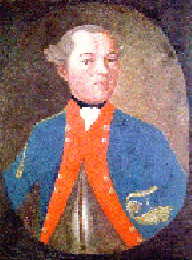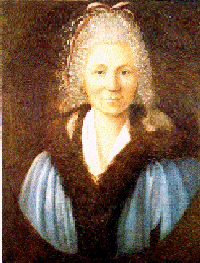
(Johann Kaspar Schiller, oil painting (around 1760) by an unknown artist)
|
INTRODUCING SCHILLER'S PARENTS |
 (Johann Kaspar Schiller, oil painting (around 1760) by an unknown artist) | Schiller's father Johann Kaspar Schiller was born in 1723 as son of a farmer and village mayor Johannes Schiller in the Wuerttemberg village of Bittenfeld near Waiblingen. He apprenticed as a medical practitioner and went journeying when he was eighteen years old. After journeying through Wuerttemberg, he joined a Bavarian regiment and served in it as army physician, taking part in Bavaria's campaign against Austria in the Austrian War of Succession (to the Habsburg throne). When this war was over, Johann Kaspar returned from the Netherlands, his last army location, to visit his sister in Marbach. |
 (Elisabeth Dorothea Schiller, nee Kodweiss, oil painting (around 1760) by an unknown artist) |
Here, he met Elisabeth Dorothea Kodweiss, the daughter of the then still well-to-do Marbach baker, lumber trader, inn keeper and government agent Georg Friedrich Kodweiss. As already mentioned in the time table, the couple were married in 1749. At first, Johann Kaspar tried to settle in Marbach and to earn a living as freelance physician. However, he could not make ends meet so that after four years, he joined the Wuerttemberg regiment, at first as a lower-rank soldier who was responsible for provisions and quarters. In his later 'curriculum vitae meum' which he wrote in 1789, he even admitted that bankruptcy had urged him to take this step. |
While all of the above information is factually correct and instructive, it does not provide us with any idea of what Schiller's parents were like as individuals. For that, we might wish to turn to the 1823 Schiller biography written by Thomas Carlyle. While Carlyle's language in that work is not yet as powerful as that of his 'Sartor Resartus', he shows great insight into Schiller's motivations for his artistic and intellectual pursuits. The work also contains a translated compilation of Schiller family information from various sources. This is featured as an appendix in Carlyle's work.
In this appendix, Johann Caspar Schiller is described as a pious, yet practical man who may have met in his wife Elisabeth Dorothea Schiller 'a kind of enthusiast, because she, with average faculties of understanding, combined deep feeling, true piety and love of Nature, a talent for Music, nay, even for Poetry. But perhaps it was the very reverse qualities in her, the fact namely that what she wanted in culture, and it may be also in clearness and sharpness of understanding, was so richly compensated by warmth and lovingness of character,--perhaps it was this which most attracted her to the heart of her deeply reasonable Husband' (Carlyle 257).
At this point, we
should leave off here to return to the chronological sequence of
the time table.